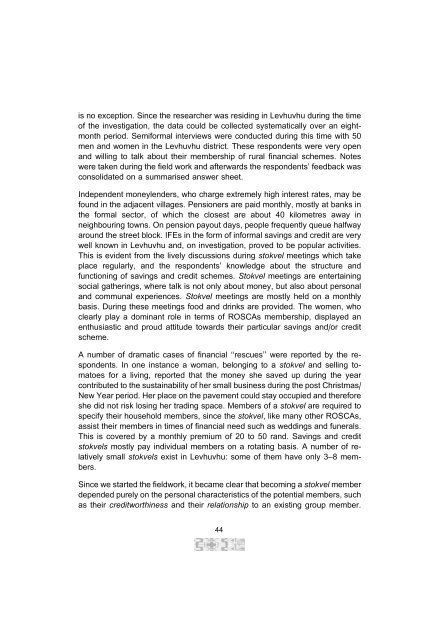AFRICANUS Vol 30 No 2 ISSN 0304-615X - University of South Africa
AFRICANUS Vol 30 No 2 ISSN 0304-615X - University of South Africa
AFRICANUS Vol 30 No 2 ISSN 0304-615X - University of South Africa
You also want an ePaper? Increase the reach of your titles
YUMPU automatically turns print PDFs into web optimized ePapers that Google loves.
is no exception. Since the researcher was residing in Levhuvhu during the time<br />
<strong>of</strong> the investigation, the data could be collected systematically over an eightmonth<br />
period. Semiformal interviews were conducted during this time with 50<br />
men and women in the Levhuvhu district. These respondents were very open<br />
and willing to talk about their membership <strong>of</strong> rural financial schemes. <strong>No</strong>tes<br />
were taken during the field work and afterwards the respondents' feedback was<br />
consolidated on a summarised answer sheet.<br />
Independent moneylenders, who charge extremely high interest rates, may be<br />
found in the adjacent villages. Pensioners are paid monthly, mostly at banks in<br />
the formal sector, <strong>of</strong> which the closest are about 40 kilometres away in<br />
neighbouring towns. On pension payout days, people frequently queue halfway<br />
around the street block. IFEs in the form <strong>of</strong> informal savings and credit are very<br />
well known in Levhuvhu and, on investigation, proved to be popular activities.<br />
This is evident from the lively discussions during stokvel meetings which take<br />
place regularly, and the respondents' knowledge about the structure and<br />
functioning <strong>of</strong> savings and credit schemes. Stokvel meetings are entertaining<br />
social gatherings, where talk is not only about money, but also about personal<br />
and communal experiences. Stokvel meetings are mostly held on a monthly<br />
basis. During these meetings food and drinks are provided. The women, who<br />
clearly play a dominant role in terms <strong>of</strong> ROSCAs membership, displayed an<br />
enthusiastic and proud attitude towards their particular savings and/or credit<br />
scheme.<br />
A number <strong>of</strong> dramatic cases <strong>of</strong> financial ``rescues'' were reported by the respondents.<br />
In one instance a woman, belonging to a stokvel and selling tomatoes<br />
for a living, reported that the money she saved up during the year<br />
contributed to the sustainability <strong>of</strong> her small business during the post Christmas/<br />
New Year period. Her place on the pavement could stay occupied and therefore<br />
she did not risk losing her trading space. Members <strong>of</strong> a stokvel are required to<br />
specify their household members, since the stokvel, like many other ROSCAs,<br />
assist their members in times <strong>of</strong> financial need such as weddings and funerals.<br />
This is covered by a monthly premium <strong>of</strong> 20 to 50 rand. Savings and credit<br />
stokvels mostly pay individual members on a rotating basis. A number <strong>of</strong> relatively<br />
small stokvels exist in Levhuvhu: some <strong>of</strong> them have only 3±8 members.<br />
Since we started the fieldwork, it became clear that becoming a stokvel member<br />
depended purely on the personal characteristics <strong>of</strong> the potential members, such<br />
as their creditworthiness and their relationship to an existing group member.<br />
44
















